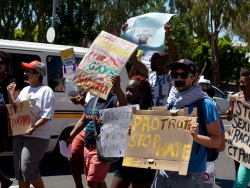Nigerian researcher advises to challenge neo-colonial homophobia in universities

18 July 2017 - A Nigerian researcher, Kehinde Okanlawon, has published an article detailing the experiences of LGBT students in Nigerian universities. He recommends to develop education that explains why same-sex relations are not un-African, to redevelop development policies and to prosecute homophobic evangelicals.
Image: Protest against discrimination in Nigeria during the 2014 Pride in Cape Town. Photo: Samantha Marx, Johannesburg, South Africa
Neo-colonialism creating a homophobic trend in Nigeria
Nigeria is a former British colony which became independent in 1960 and inherited English as its official language. Nigeria has a secular constitution and a federal form of government that is democratic and civilian in nature. On the one hand, Nigeria has a protective constitution that guarantees everyone the right to education without discrimination and also the right to privacy. The population is relatively highly educated. On the other hand, Nigeria has laws that criminalize homosexual acts in the Criminal Code and the Sharia penal code. Punishments vary from 14 years imprisonment to the payment of fines or even a death penalty in some states in northern Nigeria. However, no convicted LGBT person has been sentenced to death in Nigeria. Still, some have been imprisoned using the harsh antigay laws inherited from the United Kingdom during colonialism. Religion plays a major role in the lives of most Nigerians. Some American evangelicals fuel homophobic prejudice on Nigerian campuses through funding antigay programs in universities. These programs are sometimes disguised as a so-called Campus Crusade for Christ. Some antigay evangelical pastors have also incited homophobic prejudice among Nigerian high school students by mobilizing them to protest against LGBT rights in the parliament in 2011 with inscriptions on their T-shirts saying, "Same-sex marriage is unnatural and un-African."
Disciplined for being gay or lesbian
The study by is based on interview with 14 gay and lesbian university students, combined with data on Nigerian LGBT students from relevant public media sources. He reports gay and lesbian students perceived the bullying from fellow students as inevitable and as a better option than being suspended or expelled by the school authority. Many LGBT students spoke of the common practice of being called names on campus such as homo, faggot, lesbo, woman, and gay lord. The condemnation of homosexuality by Nigerian school authorities on moral grounds often took expression in different punishments. For example, one student stated, "A final-year student of Covenant University was expelled for committing
lesbianism." A gay student was almost deprived of his certificate by the university despite his academic excellence. "He was on the disciplinary committee twice because he is gay. The disciplinary committee acknowledged that he graduated with a good grade but that he didn’t have the morals required for a student who ought to be a good ambassador of the university. Fortunately, with the interventions of family and friends, he was eventually given his certificate.”
Some heterosexual students take advantage of the illegal nature of homosexual acts and the restricted access of gay and lesbian students to social justice to extort or blackmail them. Violence can occur when gay or lesbian students approach other students they think are gay/lesbian, or straight students trying out gay and lesbian students to admit their sexual orientation by approaching them sexually.
Nevertheless, a few LGBT students had positive experiences of being defended by some tolerant students and lecturers who consider homophobic bullying as unjust.
Recommendations
Okanlawon sees heteronormative oppression as a neo-colonial legacy. Both African and Western countries have responsibilities to amend these. To move forward, he advocates challenging the narrative that homosexuality is un-African and a Western sexual immorality. Nigerians need to be educated that it is actually homophobic bullying that is un-African because Nigerians and many Africans have been historically tolerant of diverse forms of sexual and gender diversity before colonization. The researcher points to how most homophobic comments used in Nigerian schools are Western terms that are not in native Nigerian languages. He say both Nigeria and Western countries need to make amends for colonization. This can be done by developing more sensitive development policies and by bringing antigay US evangelicals who fuel homophobia to justice.
Source: Tandonline


